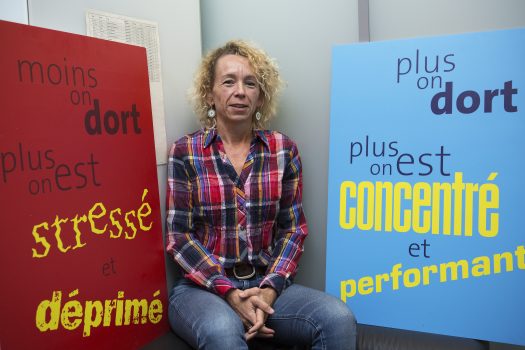
Sophie Schwartz
Nom du groupe: Sleep and Cognition Neuroimaging Laboratory
Group type: Main
Affiliations: Faculty of Medicine, Department of Basic Neurosciences
Domaines: Perception, Attention and Cognition, Affective and Social Neurosciences, Development and Plasticity
Mot clés: brain imaging, creativity, dream, Emotion, memory, modelling, sleep
Activités de recherche
The Sleep & Cognition Lab explores the mysteries of the sleeping brain using advanced neuroimaging (fMRI, hd-EEG, MEG), behavioural testing, and computational modelling, in combination with experimental approaches aiming at modifying sleep and related cognitive/affective processes.
Our research is structured around three main axes:
- Investigating Core Cognitive and Affective Functions during Sleep
We study the neural mechanisms underlying key cognitive functions during sleep:
- Memory consolidation: e.g., How sleep stabilizes and reorganizes memory traces, including via neural replay.
- Emotion and salience: e.g., How emotional and motivational relevance biases memory reprocessing during sleep.
- Dreaming: What are the neural and cognitive bases of dreams.
- Creativity: How sleep favours creative insights.
- Improving Sleep & Dreams: From Neural Entrainment to Clinical Applications
We design and test interventions to enhance sleep:
- Neuronal entrainment: Using sensory (e.g., vestibular stimulation using a rocking bed) to deepen sleep and enhance memory.
- Workshops and applied interventions: Programs tailored to different populations (e.g., adolescents, athletes) aiming at improving sleep and waking performance.
- Clinical applications: Techniques like imagery rehearsal therapy (IRT), targeted memory reactivation (TMR), slow wave suppression, and pharmacological interventions to understand and improve sleep in psychiatric and neurological disorders.
- Exploring New Measures of Sleep
We develop new ways to monitor and interpret sleep-related processes:
- Physiological markers: Exploring metrics like pupil size as real-time indicators of arousal during wakefulness and across sleep stages.
- Brain-body coupling: Investigating the coupling between the brain and bodily signals (e.g., heart rate and breathing), and its impact on the processing of external stimuli during sleep.
Ongoing collaborations
We work across disciplines — neuroscience, psychiatry, linguistics, computational modelling — with collaborators such as:
- Jean-Baptiste Beau, head of Oniri (Lucid dreaming, Dream database)
- Pr. Olaf Blanke (Consciousness, Self-embodiment)
- Pr. Corrado Corradi-Dell’Acqua (Emotion & Salience)
- Dr. PD. Marzia De Lucia (Brain-body coupling, Consciousness)
- Pr. Daniel Huber (Animal models, Motor control)
- Pr. Karim Jerbi (Creativity, Brain networks)
- Pr. Nina Kazanina (Language & Cognition)
- Pr. Marina Laganaro (Speech, Neurodevelopment)
- Pr. Pierre Mégevand (Epilepsy, Intracranial recordings)
- Pr. Christoph Nissen (Sleep, Psychiatry)
- Dr. DR2. Delphine Oudiette (Cognition, Narcolepsy)
- Pr. Lampros Perogamvros (Dream analysis, Psychiatry)
- Pr. Dimitri Van De Ville (Signal processing, Computational modelling)
Dernières publications
Scream's roughness grants privileged access to the brain during sleep.
Impact of spindle-inspired transcranial alternating current stimulation during a nap on sleep-dependent motor memory consolidation in healthy older adults.
Cardiac signals inform auditory regularity processing in the absence of consciousness.
Interactions between physical exercise, associative memory, and genetic risk for Alzheimer's disease.
Hide the members of the Lab

Prof. Sophie Schwartz
+41 22 37 95 376
sophie.schwartz@unige.ch

Kinga Igloi

Alison Montagrin

Virginie Sterpenich
+41 22 37 90 740
virginie.sterpenich@unige.ch

Laurence Bayer

Victor Férat

Célia Lacaux


Laure Colin
laure.colin@unige.ch

Gabriel Hinnen




Paola Soulié
paola.soulie@etu.unige.ch

Nina Wiedemann
nina.wiedemann@etu.unige.ch
Contact
Faculté de médecine
Université de Genève
Email: Sophie.Schwartz@unige.ch